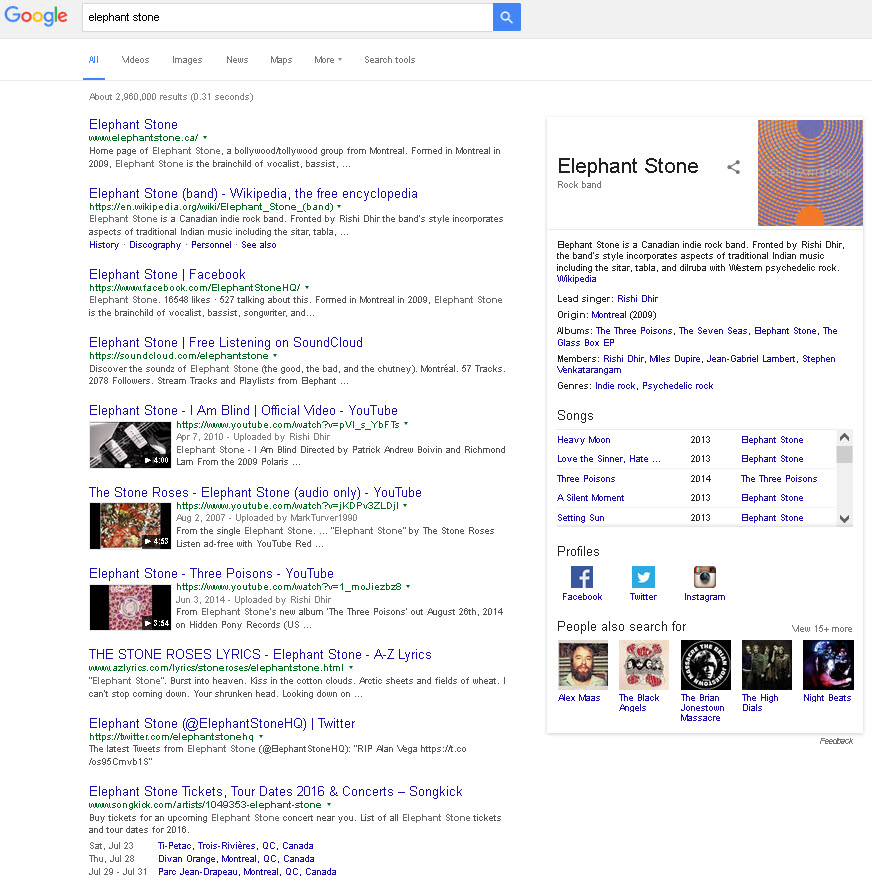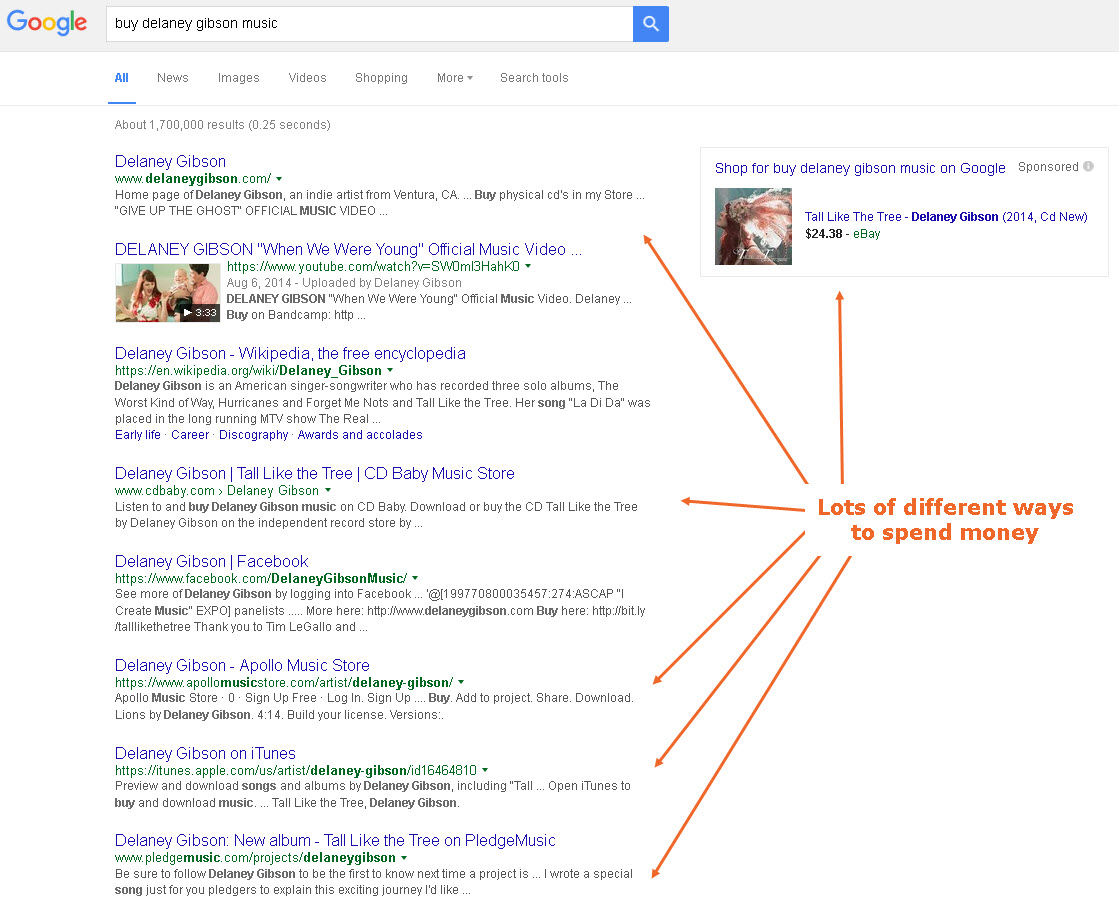This post was written by Wes Walls and originally appeared on the Bandzoogle Blog.
When we talk to other musicians about music marketing, search engine optimization is a topic that comes up often.
And why not? It’s free, it’s known as a highly effective marketing channel for millions of businesses, and it works.
The downside is that it’s complex, time consuming, slow to see results, and it’s known as a bit of a dark art.
SEO is not particularly easy to do well, and as a musician you just don’t have time to become an SEO rockstar. You have songs to write, tours to plan, rehearsals to organize.
A lot of the SEO advice out there for musicians skims the surface: optimize your title tags, get backlinks, create content, and such. This is all relevant and useful advice, but we need to address the critical strategic aspect that makes SEO for musicians a little bit different than SEO for everyone else.
(Except this excellent article that you should read)
In this article we’ll cover the bigger picture - the abstract and conceptual. We’ll address the big question, which is: “How can SEO actually help me as a musician?”
This is a question you need to have the answer to, in practical terms, before you start investing your time in your SEO. Just because certain SEO strategies work for millions of businesses, doesn’t necessarily mean they will work for musicians.
Musicians need a unique SEO strategy with it’s own unique set of tactics. In this article we’ll define a strategic framework to start from.
We would consider this critical reading before you jump into reading any other tactical SEO advice.
The Fan Journey
It all starts with your fans.
For artists, SEO is all about using search engines to help create a positive experience for your fans.
As you build your fan base, your audience will move through some series of steps to eventually reach whatever goal they had in mind. Throughout those steps, they will have experiences online as they engage with your music and brand.
Some of those experiences will involve search engines. So, what we need to do first is understand where search engines get involved.
Wait…. don’t get bored!! Check it out.
To help us visualize let’s adapt a classic marketing framework, the customer journey, and apply it to the average music fan, as it relates to a typical band. We’ll call it the Fan Journey.
We made a fun colourful graph for you (yay!).

If you’re feeling ambitious, you might want to take some time to map out the Fan Journey for your band, taking into account your unique circumstances.
So, now… “At what point do search engines come into play?”
Take a second to stop and think about it…
OK, let’s break it down by phase.
Discovery
In marketing, this step is usually called “Awareness” and it’s where SEO does its magic for most businesses.
Here’s an example: say you want to build a website for your band, so you go to Google and type in “band websites”. There, you’ll find Bandzoogle. Now you’re aware of our company. And that’s very important to us.
But, what if you’re a band that plays original music? How are search engines going to help you here?
Well, they’re not.
Nobody discovers new bands by searching on Google. Nobody types in “new band i’m going to love” and expects to actually find a new band they’re going to love. Nobody searches “indie band in toledo” to find new local music in Toledo.
Ever played to an empty room? Yeah…..
This is what an empty room looks like in SEO.

Womp womp wommmmp.
Not only would you go through a lot of pain trying to rank for a search term like that, you probably won’t manage to do it.
And most importantly, that just isn’t how people discover music right now.
For bands, the Discovery phase of the Fan Journey is probably the hardest - just getting your music in front of people who want to listen. Search engines are not likely to help you directly with this.
Exploration
Exploration happens after a fan discovers you, likes what they hear, and wants to hear more.
This is where search engines start to really matter for most bands.
Ask yourself: “What will most people do after they hear my song, and they really love it, but they don’t know my band yet?”
They’ll probably want to know what you look like, where you come from, what other people think of you, what your other music sounds like, where you’re playing next, etc.
One of the first things they might do is Google your band name… Or maybe the song name…. Or maybe some lyrics that got stuck in their head….
Let’s say you just discovered this awesome song you’ve never heard by Elephant Stone. You search their name and…. ding!!!

Awesome, so much great stuff!!
So this is where SEO first comes into play for you, in a big way. It’s your opportunity to show your new fans everything you’ve got. You want to make sure that when they search for your band or music, you’ve got a really pro selection of content for them to check out.
Your audience, at this stage of the Fan Journey, are really potential fans who want to get to know you. Help them out by making sure they can easily find things like:
- Your website, so they can learn about you
- Your social profiles, so they can see what kind of things you say
- Music to stream, so they can sample your sound and decide whether they like it
- Videos and images, so they can get a feel for what you look like
- Interviews and reviews, so they can get a sense for who you are and what others say about you
- Tour dates, so they can see that you’re active and whether you’re playing in their town
You want potential fans to be able to easily find all of that wonderful stuff you’ve poured your heart, soul and bank account into.
So the Exploration phase of the Fan Journey is where search engines can really help you the most, and it’s where strategically you should spend most of your SEO efforts.
Purchase
The Purchase phase of the Fan Journey is - no surprise - hugely important for any artist who wants to build a sustainable career. Like any business or entrepreneur, you have a bottom line. You need to make money to keep going.
Search engines can help you here.
The key is making it quick and easy for fans to spend their money on you, when they’re ready. As it happens, search engines are really useful when people want to find things online quickly and easily.
Bingo.
Let’s look at Delaney Gibson as an example. If a fan searches for “delaney gibson tickets” or “buy delaney gibson music”, that fan is probably ready to spend money on her.
If you, as a musician, want money from your fans (and we know you do) then you had better be sure they can spend it on you without much hassle.
So pave the way for them. Heck, sprinkle a little trail of skittles if that’s what it takes!
Of course, this is about more than just search engines. You have to sprinkle skittles all over the place, like on your website and other profile pages. But sprinkle some on the search engines too.
Let’s see what Delaney did.

Nice.
Delaney has done the legwork and provided her fans with a wealth of different ways to spend their money on her, in whatever way is most convenient, useful or interesting to them. It’s all very easy to find by doing just one Google search.
[How To Create a Perfect Page to Sell Music on Your Website]
Skittles…..
So we want to make sure your fans can easily find:
- Tour date information and concert tickets
- Somewhere to buy your music for download
- A store to buy physical music formats and merch
- Your profile on major streaming services to easily sync your music
For the Purchase phase of the Fan Journey, you can use search engines to help your fans find different ways to spend money on you, without having to do any digging around.
Retention
In today’s music industry attention spans are short, fans are fickle, and thousands of talented artists are constantly releasing great new music and content. It’s not guaranteed that you’ll keep the attention of your hard-won fans, even after they’ve downloaded your album or gone to your show.
Which makes fan Retention more important than ever.
As far as search engines go, though, there isn’t a lot that SEO can help you with here. Once your fan has gone to your concert and downloaded your album, most of your Retention is going to happen everywhere else but search engines.
So, for example, stuff like this comes into play for retaining your fans.

Things like: signing fans up to your mailing list, or growing your audience on social media. Maybe fans follow you on Spotify. That sort of thing helps you with fan Retention.
[9 ways to build your mailing list]
As long as your fans can still find you when they do look for you, that’s all the search engines need to do at the Retention stage of the Fan Journey. So it won’t be a focus of your SEO strategy as a musician.
Advocacy
The Advocacy stage of the Fan Journey is where you’ve already won your fan over to the point where they become a super fan. He or she follows you, and you’ve created some sort of relationship with them. They feel invested in your success. They want to share your music with other people, to help build the movement. They’re the ideal, devoted fan.
Of course Advocacy is a very important Fan Journey stage for your band. But search engines probably won’t be especially useful to you here, because at this point your super fans don’t need Google to find you - they already know where you are.
The Takeaway: Get To Know Your Fan Journey
At this point you’re probably thinking “Great, this makes sense and all, but how do I actually start doing SEO?”
In follow-up posts, we’ll dig deeper into the technical and tactical advice you can use to create a positive search engine experience for your fans.
In the meantime, get to know your Fan Journey. Map it out and explore it. Poke holes in it, and find out where you’re weak and where you’re strong.
As far as SEO goes, you should focus on the Engagement and Purchase steps of the Fan Journey. But look at the other steps too. Maybe there is something specific to your band where SEO can help with your Discovery, Retention or Advocacy strategies.
Hopefully you now have an understanding of where you need to start with your SEO. Next time we’ll explore tactics that you can take action on.
Wes Walls is the Head of Growth Marketing at musician website & marketing platform Bandzoogle